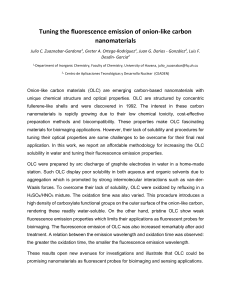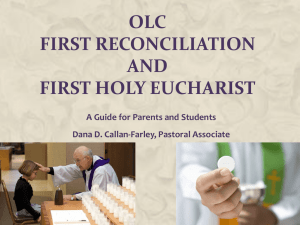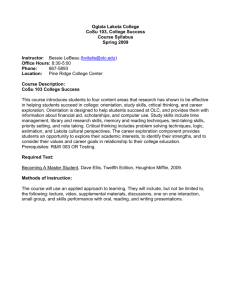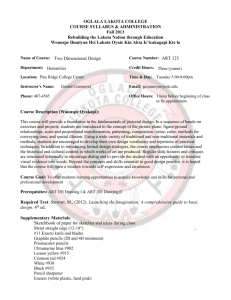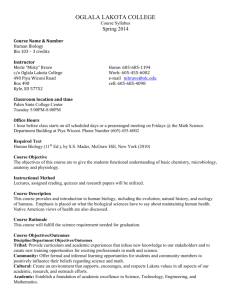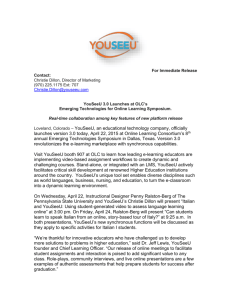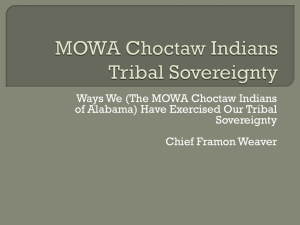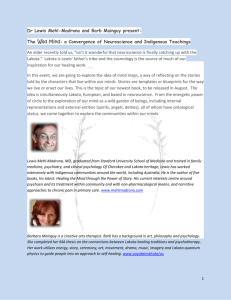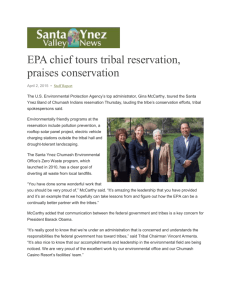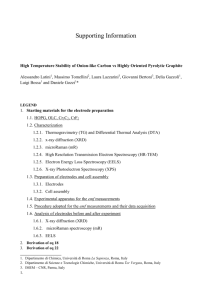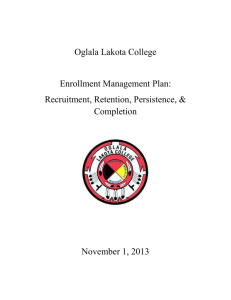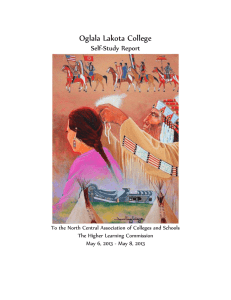Math-Science Review - OLC Warehouse
advertisement
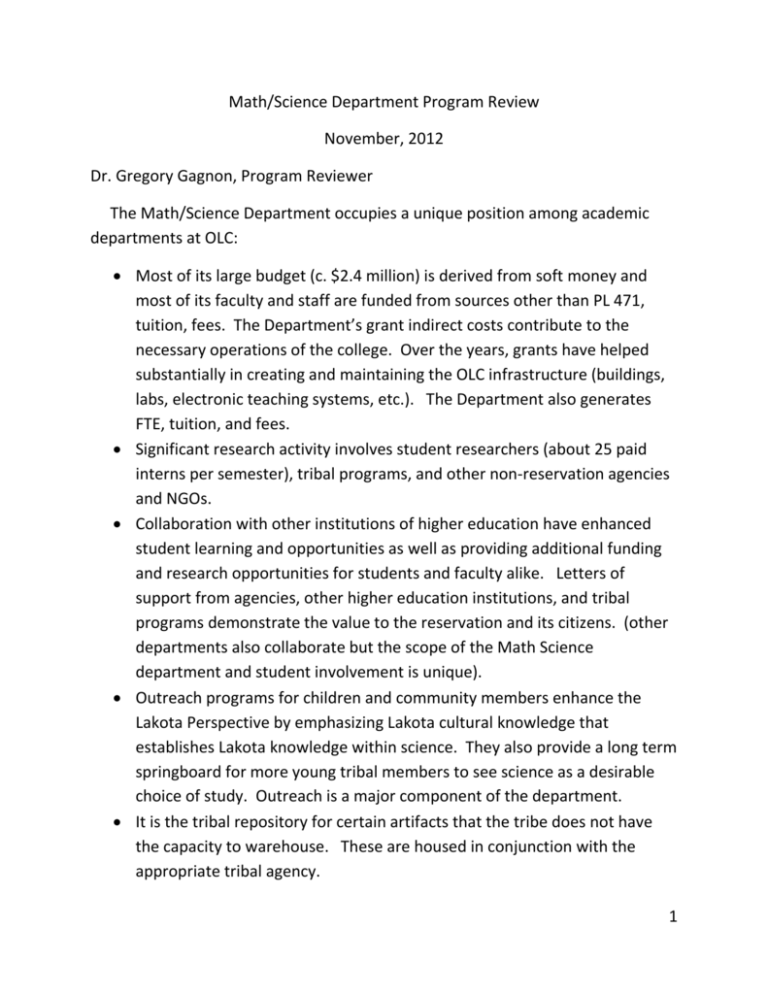
Math/Science Department Program Review November, 2012 Dr. Gregory Gagnon, Program Reviewer The Math/Science Department occupies a unique position among academic departments at OLC: Most of its large budget (c. $2.4 million) is derived from soft money and most of its faculty and staff are funded from sources other than PL 471, tuition, fees. The Department’s grant indirect costs contribute to the necessary operations of the college. Over the years, grants have helped substantially in creating and maintaining the OLC infrastructure (buildings, labs, electronic teaching systems, etc.). The Department also generates FTE, tuition, and fees. Significant research activity involves student researchers (about 25 paid interns per semester), tribal programs, and other non-reservation agencies and NGOs. Collaboration with other institutions of higher education have enhanced student learning and opportunities as well as providing additional funding and research opportunities for students and faculty alike. Letters of support from agencies, other higher education institutions, and tribal programs demonstrate the value to the reservation and its citizens. (other departments also collaborate but the scope of the Math Science department and student involvement is unique). Outreach programs for children and community members enhance the Lakota Perspective by emphasizing Lakota cultural knowledge that establishes Lakota knowledge within science. They also provide a long term springboard for more young tribal members to see science as a desirable choice of study. Outreach is a major component of the department. It is the tribal repository for certain artifacts that the tribe does not have the capacity to warehouse. These are housed in conjunction with the appropriate tribal agency. 1 The department has adopted the Constructivist Teaching philosophy which is the dominant pedagogy in Science and other areas of higher education. Students are involved in hands-on activities that are significant to them and these are used to inform the acquisition of skills and knowledge. Particular attention is paid by all faculty including general education courses to the Lakota perspective and reservation topics. The Department combines research, teaching, and service in ways that differ from other departments at OLC where teaching has been the primary focus since its chartering by the tribe. A greater effort is needed to incorporate Math Science into the culture of Oglala Lakota College in a way understood by all of the college constituents. The department provides service to the other departments and supports the general studies core curriculum by offering math, science, and computer courses. It offers bachelors and associate degrees in Natural Science and in Information Technology with various permutations and emphases available. It has had several reorganizations and revision of emphases prior to this review. The Process of Review This review is the first program review since reorganization of the department. Dr. Ursula Gaertner with the support of President Shortbull decided that an external evaluator could bring a perspective to the review that could be useful and complement the continuing Self Study by OLC. It is based on interviews with most of the faculty and staff plus a few students, and upper level administrators over several days (Nov. 13-16 ), phone and email discussions, and information supplied. Department members were forthcoming, hospitable, and rather candid. I thank them for making this process easier. The review approach is basically qualitative and focused on administration/management because the grant programs are reported on regularly and because the context of the department needs to be considered 2 for long range planning before academic content is externally reviewed. Review of financial accountability and stability was not possible due to the illness of the chief business officer at OLC. Note: A brief review of the degree programs and courses offered indicates that courses and degrees are consistent with practice in the several fields offered by the department. Faculty demonstrated knowledge of their fields, have appropriate degrees, and the science faculty and staff are active researchers. The most recent administrative change has been switching from a dual chairmanship to a single chairperson. Other changes have included dropping an associate degree in information technology as OLC begins a shift toward more bachelor’s degrees and fewer associates as part of its continuing evolution as an institution of higher education. [Note: this transition particularly affects science, information technology, and mathematics because their role at community colleges is significantly different from that of a bachelors level institution with the possibility of expanding graduate offerings beyond the two currently offered. Research, advanced mathematics, and whether or not to maintain vocational emphasis computer skills are needed in a more complex, diversified curriculum for the college. FINDINGS AND RECOMMENDATIONS: Reviews, by their nature, emphasize areas that need to be improved even for the best of programs. The emphasis below is on continuing the movement of a quality department to a more efficient and more effective component of Oglala Lakota College while retaining quality. Most of the suggestions revolve around the need for improved administration and accountability for a dynamic department. The Math Science Department is a valuable component of the college and supports OLCs mission in many different areas. Its community outreach and constructivist approach to teaching enhances the Lakota perspective and reflects trends in higher education. Its ability to draw 3 funding (more than $5.5 million in new grants during the past five years and funding agencies have added additional funding to the grants because they are considered to be working). Another contribution is that about 25 interns are funded each semester—these can be the future of science on the reservation and are employable. Note: eight graduates last year: 4 are employed on the reservation and 4 are in graduate school. Others are planning their futures in graduate school and professionally (graduates’ success and achievement is one measure of a college’s quality). Some particular strengths: 1. The Lakota perspective within a scientific context is valued, emphasized, and constant. Ms. Helene Gaddie developed an excellent DVD that emphasizes Lakota culture and its relationship to science but the faculty discussed it continuously. Science is not presented as “theirs” but rather as “ours.” 2. The Constructivist approach to teaching puts the emphasis on student learning and was enthusiastically described by students interviewed. 3. Collaboration with other institutions. 4. Outreach programs to help develop a science literacy within the community and prepare students for eventual involvement in STEM study. 5. 96% of Math Science graduates are employed or in graduate school. Key Recommendation: An additional administrator is needed for the department. The current chair is well supported by those who commented on the change to one chairperson. He, and others conclude that Administrative Management at a high, accountable level is needed to monitor the activities of the department, to assure oversight of activities, and to report in a timely manner to the rest of the college. This position can enable the mission of teaching, research, and community outreach to continue. Administrators and staff alike indicate that assessment needs to be collected, that a constant-daily presence is needed in the department for fielding inquiries, that information needs to completed and on time for the operations of the college (for instance annual reports, budget preparations, flow of spending, assessment, departmental records, centralized repository of 4 reports and calendars general communication with other units of the college, maintenance of MOUs, etc. These are not tasks for a lower level administrative assistant—it is more like an associate department chairperson for administration. It is a full time position rather than a blended one that combines other activities with some administrative duties. If this recommendation is implemented, the job description for the person must be carefully crafted to meet the needs identified and the skill set needed for the position. Such a position can greatly alleviate concerns that faculty and staff are not accountable for their time and that they pursue interests not compatible with college goals and mission (note: without constant communication about the nature of the program and activities, such questions arise at nearly every institution—the unknown always raises questions particularly if there appears to be operations that differ from other departments and programs at the college.) The college administration needs to implement a long range planning activity to address the proper place in an increasingly complex institution for science/math. Is it to be a supplement or an integral part of the college? Among the issues that should be considered: 1. What happens when soft money is not continued? NSF funds the creation of programs, not their continuation. This was one of the reasons that faculty endowment has been put aside, how will it work? Faculty and staff express concern about this BECAUSE most were told when they were hired that they had to support themselves. This is not an unusual problem –most universities with a research mission face this but OLC now needs to regularize it for the stability of the college. 2. What are the Core components of the department? Most of these should be funded with non-soft money positions. How many math positions are necessary to the meeting of general education requirements and to the minimum necessary to maintain degrees? Science? Computer Science? 471 commitment needs to be solidified. 5 3. What are appropriate expectations for enrollment? Currently, t low enrollment classes focus on upper division, special major courses and are underwritten by grants; this might not continue indefinitely. Science and Math programs are under-enrolled throughout the country, perhaps particularly among tribal colleges. My suggestion is that OLC needs to keep science programs and research to prepare students for the jobs that require scientific competence or the reservation community will be dependent on others for meeting these needs. However, continuing emphasis is needed on recruiting (outreach programs like the math and science camps integrated with Lakota cultural norms help). The Constructivist approach needs to be better assessed to see how well it works for retention and success. High attrition rates in math and science classes will continue until the schools get better; even where the most prepared student bodies exist, STEM courses have the highest attrition rates—they are hard and they build on previous knowledge. Competition for STEM oriented students in the high schools is fierce---all of the colleges want to increase their Indian STEM enrollments. Two areas that show some promise for increasing effectiveness of math/science learning are offering courses more than once weekly (some districts have reverted to the once weekly classes for convenience and this needs to be nipped) and better scheduling that allows student to take math courses consecutively rather than with gaps between one course and another of a year or so. 4. The function of instructional technology within OLC needs to be clarified. Perhaps its best use could be as a complement to science programs with other courses adapted to serve majors like Social Work and even Education. Perhaps it should return to offering an AA that can move its graduates into support positions with the many tribal programs. Reservation needs should be projected to help determine this. 6 5. Mathematics courses have high attrition rates. There are a number of ways that this problem should be examined: 1)Perhaps the relationship between Mathematics and the mathematics courses offered in Foundational Studies needs to be examined. Often there is a disconnect between what foundational courses are offering and what mathematics is offering. 2)Many colleges offer foundational (developmental) courses in one department and college level courses in another so this is a standard approach. However, so many students need to take so many developmental and pre-algebra courses that both of OLC’s departments could better assist students through some other configuration of foundational and college level integration. 3) Perhaps the Math Science Department and other departments need to assess what the actual mathematics needs are for student proficiency in each major. Some colleges are looking at whether or not they are just following the way it has always been done or whether or not particular courses are actually needed. 4)District staff do most of the advising and registration for general studies enrollments so they need to work on having students enroll in mathematics consecutively. Maybe policy changes need to be made to allow low enrollment courses in the districts which have low numbers of students (Pass Creek and Batesland for instance) for the good of student learning. 5)Maybe a policy change that requires re-taking a math course before enrolling in the next level if more than one semester has elapsed would help. 6) What do the district staff see as solutions? 7) Do faculty members need to have additional training in effective teaching methods? 8) What is the place of adjunct teachers in the various issues of mathematics competency? 9)There are many possible changes but they need to be weighed before being implemented and effectiveness of changes assessed. 6. Administrators throughout the college need to devote time to understanding what the Math Science department is doing. They 7 need to insist on timely reports that they then review. They need to interact regularly with the department chair and others to make sure that this major part of the college is operating effectively. Where adjustments are needed in policies and procedures, they need to made consciously. 7. He Sapa Center students dominates the math-science majors. This causes problems for them to do labs but it also reflects the better preparation of He Sapa students but it reduces impact on the reservation itself. Cheyenne River Reservation center is an additional topic. (the changing balance of student residence and center enrollments needs to be examined by the college as a whole…Math Science is part of this). What should be done? 8. The grant funding dependence of Math Science highlights the need for OLC to have a Clearing House for grant applications. Not only must they be inherently fiscally sound, but the commitments they make must be part of college considerations. Someone needs to make sure that deadlines are known and met. Sometimes grants demand other departments to support the granted department/program and this must be considered within the possibilities. Small grants and large ones are useful to the college. It is difficult to anticipate the value of various proposals within the mission of the college but some attention needs to be given to address it. Does the Business office need a grants person? Note: these conundrums face every college. 9. Science expenses need to be understood by the OLC community and be part of evaluation of effectiveness. (science activities are more expensive than a writing class for instance). The most immediate area that needs attention is assessment. While there is a plan and there are indicators for various programs and courses, these have not been synthesized and made a part of the regular activities of the department. (rapid turnover in assessment directors has not helped, but the department needs to follow through on what it 8 can control). Assessment should portray the results of research and outreach programs as well as the credit bearing courses with indications of how each benefits the reservation and the mission of the department/college. Are resources being allocated effectively in the collaboration and teaching relationships? The Chairman needs to gain permission for assignments of faculty and staff that deviate from OLC norms. For instance, one faculty member during the Fall Semester is doing the commendable Friday class at Black Hills State U. BUT this assignment was not approved or understood in advance. This meant that she was unavailable for the key role of governance and other duties on Fridays in order to help four students. Also, some faculty schedule tutoring sessions on Fridays at the centers with the result that they are not fulfilling their duties as faculty members at Piya Wiconi. The same may be apply when teachers work with students who come to OLC on Fridays. Another aspect of the need for permission is the balance between grant/research work and teaching for individual faculty schedules. The norm for the OLC as a whole is that all faculty teach full loads. However, it is common at most higher education institutions for grant funded or research committed faculty in the sciences to have adjustments in this pattern-sometimes to the point of not teaching at all even though they are designated as faculty members by contract and classification. OLC needs a policy concerning faculty assignments as it continues to grow in complexity of mission attainment BUT in the interim, the Chairman of Math Science needs to have any deviation approved and understood by the Vice President for Instructional Programs. The Department needs to make sure that joint activities with tribal agencies fit within the mission of the college and that MOUs and permissions by the appropriate authority are on file with the administration. They should be approved by the administration. An example: the use of the college as a repository for fossils needs to be clearly enunciated and authorized (the chairman indicated that the authorization has been made from the tribe and that the grant was 9 signed off on by administration but the administration indicated that it did not have copies). Another example would be water research conducted with the tribe. The administration and department must be particularly sensitive to these kinds of interactions because of the larger issue of sovereignty. Likewise, budget adjustments and expenditures that are approved by program officers need to be noted and filed with the business office and usually discussed with supervisors. Outreach programs should be assessed. Some people at OLC expressed confusion about what outreach activities were to accomplish and their relationship is to science and math. How do they benefit students and the college community? Math and Science personnel need to work at being better understood by the rest of the OLC community. Every grant should be publicized internally in terms of impact on the college and in layman’s language; results should be too. It would be nice if other members of the community took a greater interest but science and math need to generate their own involvement in the college as a whole. I was impressed with the enthusiasm of the faculty and staff about the effects of their teaching and research—this enthusiasm needs to be shared with colleagues. The departmental Friday seminars are a good idea if they do not interfere with governance and if they are supplemented by participation in joint activities of the college. Could colleagues be integrated into presentations rather than just being asked to attend? It would be useful if a meeting schedule were maintained for the entire department. Increasing collegiality among those doing discrete activities during the week is a positive and helps build consensus. The subsets of the department do meet and this should continue too. The Spring semester should be marked by having faculty schedules readily available and creating and maintaining continuous attention to the intra-campus communication. The Math Science Department should not be Waldo. Schedules will indicate the combinations of teaching, research and service necessary for faculty and staff. 10 The Math Science Department has achieved a great deal for the students of Oglala Lakota College. It offers opportunities for them to develop substantial expertise in areas where the tribe has a paucity of resources. It has both short term impacts and the long term impact is nurturing a growing mileu of science literacy for the reservation and the Indian community in Rapid City. It works collaboratively with tribal and off-reservation entities. It can improve its impact by more effective, much tighter accountability, administration, and interaction with other elements of the college, particularly the upper administrators. The suggestions and findings above can be used to assist the Department in guiding itself to even more effectiveness. 11
